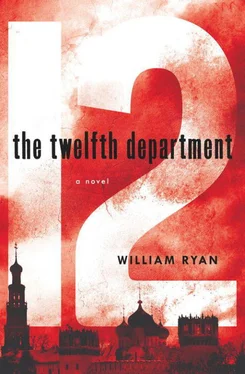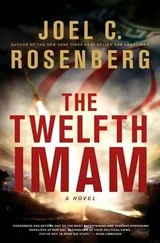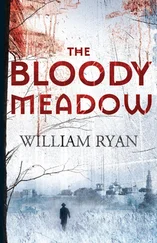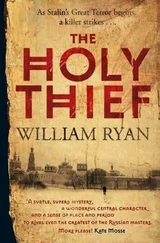“Not a speck of dust hasn’t been lifted and looked under. I’m sure as I can be that it’s not here. What’s more, Levschinsky checked the wife and the maid’s hands for gunpowder residue—nothing.”
There was a cough from behind Korolev, and Slivka, looking up to see who it was, stood so quickly that Korolev had to take a step back to avoid being knocked into.
Korolev turned to see who could have had such an effect on his normally unflappable sergeant—and found a full NKVD colonel standing in the doorway, dressed in his summer uniform, the golden sword and shield badge gleaming on his chest—alongside the Order of the Red Star, the Red Banner and several others. He was smiling at them benignly.
“Comrade Captain Korolev, isn’t it? My name’s Zaitsev.”
The colonel looked around the room and took his time doing it. He was a tall man, over six foot, and broad in a way that not many Muscovites could manage to be these days. Not exactly fat, was Korolev’s impression, more muscle gone soft. The Chekist’s round, pale face was decorated with a small triangular mustache that only covered the middle of his upper lip, and his scalp had been shaved down to a gray shadow that left his ears sticking out like jug handles and revealed an interesting collection of scars; as if someone had given the colonel a savage beating sometime in the past.
There was something almost dreamy about the colonel’s expression, but there was also an absolute authority. He turned his attention to Korolev, his thumbs hooked into the waist strap of his Sam Browne belt—the colonel’s forefingers beating time on its buckle to a tune only he could hear, as he examined him.
“What progress have you made, Korolev?” The colonel said eventually, and Korolev, as succinctly as possible, filled him in. Meanwhile it sounded as if other men were moving into the apartment, fanning out through the rooms, but it was difficult to see if this was indeed the case as it would involve breaking eye contact, which was something Korolev was loath to do.
“So, in summary,” Zaitsev said when he’d finished, “you’ve no idea who the killer is, except that he has escaped and may even now be planning his next crime.”
“We’ve only just begun the investigation,” Korolev began—but the colonel’s eyes narrowed with menace.
“I’m not interested in excuses, Korolev, and nor is the Party. We only care for results. Professor Azarov was engaged in work vital to the State and, through his death, a blow has been struck that may threaten the security of the Revolution itself. It seems to me we’ll have to take a different approach to catching this killer—a more direct one. You could be blundering around for weeks at this rate. I’m sure First Inspector Popov will assign you to something more worthy of your talents. You may go.”
Korolev must have looked confused because the colonel leaned forward so that his face was only a few inches away.
“You understand what I’m telling you, don’t you, Korolev?”
“Yes, Comrade Colonel. You want us to go.”
“That’s right, Korolev. Look at you, you’re leaving puddles on the floor. You can’t even look after yourself, let alone a matter like this. So go on, Korolev, go.”
“At your command, Comrade Colonel.”
Three Chekists slouched in the corridor behind Zaitsev, and Korolev found his cheeks warming as he and Slivka passed them. It wasn’t just shame he felt, there was anger too—a rage that flickered in his stomach like fire.
“Well, that’s that then,” Slivka said, when they’d made their way down the stairs and out of the building.
“It seems so,” Korolev said, conscious that his hands had bunched into fists.
“Back to Petrovka?”
“Why not?”
* * *
Pugnacious black clouds still scudded across the brightening sky as Slivka drove them across the Bolshoi Kamenny Bridge, but they were only camp followers to what had preceded them. The sudden storm had more or less passed and, despite the battering it had received, Moscow looked much the same as it always had—as it always would, Korolev supposed. People might come and go and regimes might change back and forth, but Moscow would remain—the city was a constant, even when everything else turned to dust. Slivka opened her mouth to speak but Korolev shook his head—there wasn’t any point in talking about it, she must know that. So they traveled in silence, listening to the car’s engine, until they reached Teatralnaya.
“Chief,” she said finally, reaching across to feel the arm of his jacket, “he really wasn’t wrong about you being wet.”
And perhaps it was just the way the sun was bathing the wet Moscow streets, turning them a brighter gold than the eye could bear, but Korolev found he was smiling.
Back at Petrovka, Popov had left instructions for them to come up straightaway and Korolev wasn’t surprised to find the First Inspector pacing his office when they entered.
“What happened to you?” he asked Korolev.
Korolev looked down at his clothes.
“I got caught in the storm—over in Bersenevka.”
Popov sighed. “You look like you went swimming, that’s what you look like. Over there in Bersenevka.”
Korolev looked down at himself, hearing an echo of the colonel’s rebuke in Popov’s words.
“It’s not as bad as it looks.”
He caught Slivka’s sideways glance out of the corner of his eye.
“That’s just as well—a drowned rat couldn’t look more drowned than you do at the moment.” Popov paused to smile. “Be sure to get yourself dry when we’ve finished here. It wouldn’t do for you to catch a summer cold.”
“I will, Comrade First Inspector.”
Popov waved for them to sit down. He walked to the window, taking his unlit pipe from his pocket as he did so and chewing on its stem. Then he turned and walked slowly back toward the desk, placing his left hand on the back of his chair as he considered them.
“Investigations don’t usually come and go this quickly,” Popov said. “But we weren’t to know the responsibility for it lay elsewhere.”
Slivka opened her mouth to speak but a glance from Popov closed it.
“You’re back on holiday, Korolev. And Slivka, you’re back chasing Gray Foxes.”
Popov pulled his chair back and sat down, taking reading glasses from the breast-pocket of his jacket and picking up a handwritten sheet of paper from the desk—precise instructions would now follow, it seemed.
“Any notes you took or other evidence collected must be given to me—I’ll see they reach the right place. If any file was opened with regard to the matter it is to be immediately closed and its contents passed to me, as before. You will not discuss or refer to the investigation into Professor Azarov’s murder—not even among yourselves. In fact, you’re to forget it ever happened. I think that’s all pretty straightforward. Understood?”
They nodded.
“Good. Off you go then.”
Korolev stood up and left the first inspector’s office with Slivka in tow.
“Are we in trouble of some sort, Chief?” she said out of the corner of her mouth as they descended the stairs.
“I don’t think so,” Korolev said, “as long as we do as we’re told we should be fine. The whole business never happened, is all.”
Korolev located the last of his cigarettes in his damp pocket, along with the matches from the car—and was pleasantly surprised when he managed to get them both to light.
“Well,” he said when they reached the second floor, where their office was. “I’d best leave you to it. Good luck with Shabalin.”
“Thanks,” Slivka said, nodding. “Good luck with your holiday.”
What else was there to say? They certainly couldn’t discuss the matter in question. So instead Korolev nodded once again and squelched off down the staircase, across Petrovka’s cobbled courtyard before making straight for the Sandunovsky bathhouse on Neglinaya Street. And there he soaked in a long bath while a white-coated attendant with a boxer’s ears took his clothes from him and promised he’d have them back dry as a bone within the hour.
Читать дальше












